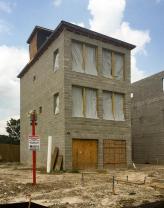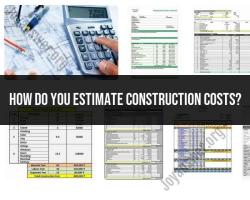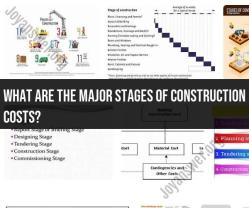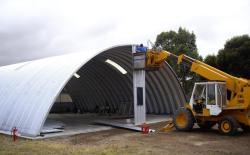How to build your own house?
Building your own house is a complex process that involves careful planning, adherence to local regulations, and coordination with various professionals. Here is a general guide on how to build your own house:
1. Research and Planning:
- Define Your Goals: Clearly outline your goals and expectations for the new house. Consider factors like size, layout, style, and features.
- Budget: Establish a realistic budget that includes construction costs, permits, land acquisition, and any additional expenses.
- Land Selection: Choose a suitable piece of land. Consider factors like location, accessibility, zoning regulations, and environmental impact.
2. Design Your Home:
- Hire an Architect or Designer: Work with a professional architect or designer to create detailed plans for your house. This includes floor plans, elevations, and specifications.
- Customization: Customize the design to meet your preferences, lifestyle, and future needs.
3. Financing:
- Secure Financing: Explore financing options, including mortgages and construction loans. Work with a lender to determine the best financing solution for your project.
4. Legal and Regulatory Approvals:
- Permits: Obtain the necessary permits and approvals from local authorities. This may include building permits, environmental permits, and zoning approvals.
- Compliance: Ensure that your project complies with local building codes and regulations.
5. Construction Team:
- Hire a General Contractor: Consider hiring a general contractor to manage the construction process. Alternatively, you may act as your own general contractor if you have the expertise.
- Subcontractors: Hire specialized subcontractors for tasks such as plumbing, electrical work, roofing, and other specific trades.
6. Construction Phases:
- Site Preparation: Clear the land, excavate, and prepare the site for construction.
- Foundation: Construct the foundation, whether it's a basement, crawl space, or slab.
- Framing: Build the frame of the house, including walls, roof, and floors.
- Utilities: Install plumbing, electrical wiring, and HVAC systems.
- Insulation and Drywall: Insulate the walls and install drywall.
- Interior Finishes: Complete interior finishes, including flooring, painting, and cabinetry.
- Exterior Finishes: Install siding, roofing, windows, and doors.
- Landscaping: Complete landscaping and outdoor features.
7. Inspections:
- Schedule Inspections: Arrange for inspections at various stages of construction to ensure compliance with building codes.
8. Finalize Construction:
- Punch List: Create a punch list of any remaining tasks that need to be completed or corrected.
- Final Inspections: Conduct final inspections and obtain a certificate of occupancy.
9. Move-In:
- Utilities Activation: Activate utilities such as water, electricity, and gas.
- Move-In: Once all inspections are complete, and the house is ready, you can move in.
10. Post-Construction:
- Warranty and Maintenance: Address any warranty issues and establish a routine maintenance schedule for your new home.
Tips and Considerations:
- Stay Involved: Regularly communicate with your construction team and stay involved in the decision-making process.
- Flexibility: Be prepared to make adjustments to your plans as needed during the construction process.
- Document Everything: Keep thorough records of contracts, permits, and communication with contractors.
Building your own house is a significant undertaking, and it's essential to approach it with careful planning and consideration. Consulting with professionals, such as architects and contractors, can help ensure a successful and smooth construction process.
How can you construct your own house from scratch?
Building your own house from scratch is a significant undertaking, requiring careful planning, extensive knowledge, and dedication. While it can be a rewarding and fulfilling experience, it's crucial to understand the complexities involved before embarking on this journey. Here's a breakdown of the key stages and considerations:
Planning and Preparation:
- Concept and Design: Determine your needs, budget, and preferred style. Develop detailed plans and blueprints with the help of an architect or designer.
- Permits and Approvals: Secure necessary permits from local authorities for construction, plumbing, electrical work, etc. Understand zoning regulations and building codes.
- Financing and Insurance: Arrange financing for your project, considering construction loans and homeowner's insurance.
- Contractors and Suppliers: Research and hire qualified contractors for different aspects of construction (foundation, framing, plumbing, electrical, etc.). Secure reliable suppliers for building materials and tools.
Construction Phase:
- Site Preparation: Clear the land, prepare the foundation, and manage utilities connection.
- Foundation and Framing: Lay the foundation and build the structure's framework with walls, roof, and floors.
- Building Envelope: Install windows, doors, exterior siding, and roofing to enclose the structure.
- Interior Work: Complete interior walls, plumbing, electrical wiring, HVAC systems, and insulation.
- Finishes: Install flooring, cabinetry, countertops, appliances, lighting, and paint to create the desired aesthetics and functionality.
Key Considerations:
- Costs and Budget: Construction costs can vary widely depending on size, complexity, materials, and location. Ensure you have a realistic budget and buffer for unforeseen expenses.
- Time Commitment: Building a house can take months or even years, depending on its size and complexity. Be prepared for a long-term commitment and manage your expectations.
- Skills and Expertise: While DIY elements are possible, some aspects like foundation work, complex electrical wiring, and plumbing typically require professional expertise.
- Physical Demands: Construction involves physical labor and requires stamina and fitness to navigate various tasks.
- Regulations and Safety: Adhere to all building codes and safety regulations to ensure a structurally sound and well-functioning house.
Building from scratch also offers advantages:
- Customization: You have complete control over the design, layout, and materials, creating a unique space tailored to your needs and preferences.
- Cost-Saving Potential: If you have suitable skills and manage effectively, DIY elements can lead to cost savings compared to hiring contractors for everything.
- Sense of accomplishment: Building your own house can be a deeply rewarding and self-fulfilling experience, bringing immense satisfaction and pride.
Ultimately, building your own house is a challenging but potentially rewarding journey. Consider your resources, skills, and risk tolerance before taking the plunge. Consulting with experienced professionals throughout the process, from planning to construction, is crucial for achieving a successful outcome.
If you're serious about this project, I recommend exploring detailed resources like construction guides, online communities of DIY builders, and consultations with architects or experienced contractors. They can provide more specific guidance and support tailored to your unique goals and context.
Remember, it's a marathon, not a sprint. Build your knowledge, plan meticulously, and enjoy the process of creating your dream home!













